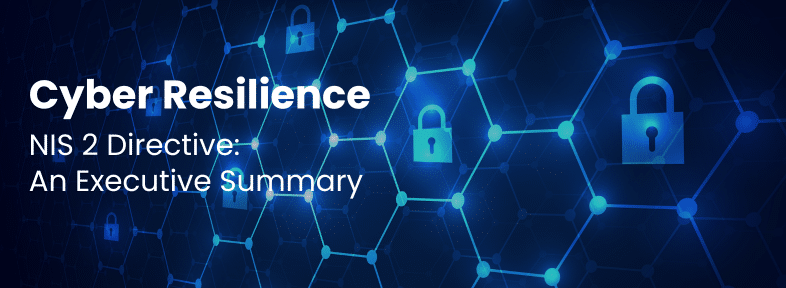An Executive Summary
Recognizing the gravity of cyber threats, the European Union (EU) has taken a stand, setting forth regulations and expectations for organizations to safeguard their digital assets. Let’s explore NIS2, what cyber resilience is, why it’s important, and how organizations can meet EU expectations and laws.
What is Cyber Resilience?
Cyber resilience refers to an organization’s ability to prepare for, respond to, and recover from cyber-attacks while maintaining critical business functions. It goes beyond traditional cybersecurity measures by incorporating prevention, detection, and robust response and recovery strategies.
This multi-faceted approach ensures that even in the face of a successful cyber attack, an organization can mitigate damage, protect its critical assets, and resume operations swiftly.
Why is Cyber Resilience Important?
Cyber attacks can have far-reaching consequences, including:
- Financial Losses: Breaches can lead to fines, lawsuits, and loss of revenue.
- Reputational Damage: Compromised customer trust can tarnish an organization’s brand.
- Operational Disruption: Attacks like ransomware can halt operations for extended periods.
- Legal Liabilities: Non-compliance with regulations like NIS2 or GDPR can result in hefty penalties.
Cyber resilience is crucial for mitigating these risks and ensuring business continuity in the face of evolving threats. Additionally, the EU’s increasing focus on cybersecurity, as evidenced by regulations such as the Network and Information Systems Directive (NIS2) and the General Data Protection Regulation (GDPR), underscores the importance of cyber resilience for organizations operating within the EU.
Meeting EU Expectations and Laws
Compliance with NIS2: NIS2 sets out cybersecurity requirements for operators of essential services (OES) and digital service providers (DSPs) within the EU. Organizations must implement measures to ensure the security of their networks and information systems, as well as report security incidents. Requirements to comply with NIS2 include but are not limited to the following:
- Conduct risk assessments to identify and mitigate cybersecurity risks.
- Establish incident response plans to respond effectively to security incidents.
- Implement technical and organizational measures to protect critical infrastructure and services.
Adoption of Best Practices
In addition to regulatory requirements, organizations should adopt best practices for cyber resilience, including:
- Regular cybersecurity training and awareness programs for employees.
- Implementation of robust access controls and encryption mechanisms.
- Continuous monitoring and testing of security controls to detect and mitigate vulnerabilities.
- Collaboration with industry peers and information sharing to stay informed about emerging threats.
Utilization of Cybersecurity Tools and Technologies
Leveraging cybersecurity tools and technologies can enhance an organization’s cyber resilience. This includes:
- Security information and event management (SIEM) systems for real-time threat detection and response.
- Endpoint detection and response (EDR) solutions for identifying and containing security incidents.
- Threat intelligence platforms for monitoring and analyzing cyber threats.
- Vulnerability scanning and penetration testing tools for assessing and remediating security weaknesses.
The Benefits of Cyber Resilience
Investing in cyber resilience is not just about meeting regulatory requirements; it also provides tangible benefits to organizations:
- Enhanced protection of critical assets and data.
- Reduced downtime and faster recovery from incidents.
- Increased stakeholder trust and improved reputation.
- A proactive posture that helps anticipate and thwart emerging threats.
Being cyber resilient can help your organization defend against cyber attacks and safeguard its digital assets. By meeting and complying with EU expectations and laws, businesses can boost their ability to withstand these threats.
Reach out to CyberCrest if your organization is seeking NIS 2 compliance support. Our firm is well-versed in helping organizations meet the Directive’s requirements.

